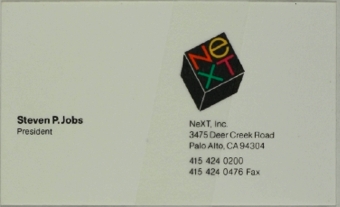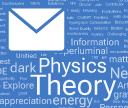I’m so sad this evening—as millions are—to hear of Steve Jobs’s death. Scattered over the last quarter century, I learned much from Steve Jobs, and was proud to consider him a friend. And indeed, he contributed in various ways to all three of my major life projects so far: Mathematica, A New Kind of Science and Wolfram|Alpha.
I first met Steve Jobs in 1987, when he was quietly building his first NeXT computer, and I was quietly building the first version of Mathematica. A mutual friend had made the introduction, and Steve Jobs wasted no time in saying that he was planning to make the definitive computer for higher education, and he wanted Mathematica to be part of it. I don’t now remember the details of our first meeting, but at the end of it, Steve gave me his business card, which tonight I found duly still sitting in my files:

Over the months after our first meeting, I had all sorts of interactions with Steve about Mathematica. Actually, it wasn’t yet called Mathematica then, and one of the big topics of discussion was what it should be called. At first it had been Omega (yes, like Alpha) and later PolyMath. Steve thought those were lousy names. I gave him lists of names I’d considered, and pressed him for his suggestions. For a while he wouldn’t suggest anything. But then one day he said to me: “You should call it Mathematica”.
I’d actually considered that name, but rejected it. I asked Steve why he thought it was good, and he told me his theory for a name was to start from the generic term for something, then romanticize it. His favorite example at the time was Sony’s Trinitron. Well, it went back and forth for a while. But in the end I agreed that, yes, Mathematica was a good name. And so it has been now for nearly 24 years.
As Mathematica was being developed, we showed it to Steve Jobs quite often. He always claimed he didn’t understand the math of it (though I later learned from a good friend of mine who had known Steve in high school that Steve had definitely taken at least one calculus course). But he made all sorts of “make it simpler” suggestions about the interface and the documentation. With one slight exception, perhaps of at least curiosity interest to Mathematica aficionados: he suggested that cells in Mathematica notebook documents (now CDFs) should be indicated not by simple vertical lines—but instead by brackets with little serifs at their ends. And as it happens, that idea opened the way to thinking of hierarchies of cells, and ultimately to many features of symbolic documents.
In June 1988 we were ready to release Mathematica. But NeXT had not yet released its computer, Steve Jobs was rarely seen in public, and speculation about what NeXT was up to had become quite intense. So when Steve Jobs agreed that he would appear at our product announcement, it was a huge thing for us.
He gave a lovely talk, discussing how he expected more and more fields to become computational, and to need the services of algorithms and of Mathematica. It was a very clean statement of a vision which has indeed worked out as he predicted. (And now it’s nice when I hear through the grapevine that there are all sorts of algorithms central to the iPhone that were developed with the help of Mathematica.)
A while later, the NeXT was duly released, and a copy of Mathematica was bundled with every computer. Although the NeXT was not in its own right a commercial success, Steve’s decision to bundle Mathematica turned out to be a really good idea, and was often quoted as the #1 reason people had bought NeXTs.
And as a curious footnote to history (which I learned years later), one batch of NeXTs bought for the purpose of running Mathematica went to CERN in Geneva, Switzerland—where they ended up having no less distinction than being the computers on which the web was first developed.
I used to see Steve Jobs with some regularity in those days. One time I went to see him in NeXT’s swank new offices in Redwood City. I particularly wanted to talk to him about Mathematica as a computer language. He always preferred user interfaces to languages, but he was trying to be helpful. The conversation was going on, but he said he couldn’t go to dinner, and actually he was quite distracted, because he was going out on a date that evening—and he hadn’t been on a date for a long time. He explained that he’d just met the woman he was seeing a few days earlier, and was very nervous about his date. The Steve Jobs—so confident as a businessman and technologist—had melted away, and he was asking me—hardly a noted known authority on such things—about his date.
As it turned out, the date apparently worked out—and within 18 months the woman he met became his wife, and remained so until the end.
My direct interactions with Steve Jobs decreased during the decade that I was for all practical purposes a hermit working on A New Kind of Science. For most of that time, though, I used a NeXT computer in almost every waking hour—and in fact my main discoveries were made on it. And when the book was finished, Steve asked for a pre-release copy, which I duly sent.
At the time, all sorts of people were telling me that I needed to put quotes on the back cover of the book. So I asked Steve Jobs if he’d give me one. Various questions came back. But eventually Steve said, “Isaac Newton didn’t have back-cover quotes; why do you want them?” And that’s how, at the last minute, the back cover of A New Kind of Science ended up with just a simple and elegant array of pictures. Another contribution from Steve Jobs, that I notice every time I look at my big book.
In my life, I have had the good fortune to interact with all sorts of talented people. To me, Steve Jobs stands out most for his clarity of thought. Over and over again he took complex situations, understood their essence, and used that understanding to make a bold definitive move, often in a completely unexpected direction.
I myself have spent much of my life—in science and in technology—trying to work in somewhat similar ways. And trying to build the very best possible things I can.
Yet looking at the practical world of technology and business there are certainly times when it has not been obvious that any of this is a good strategy. Indeed, sometimes it looks as if all that clarity, understanding, quality and new ideas aren’t really the point—and that the winners are those with quite different interests.
So for me—and our company—it has been immensely inspiring to watch Steve Jobs’s—and Apple’s—amazing success in recent years. It validates so many of the principles that I have long believed in. And encourages me to pursue them with even greater vigor.
I think that over the years Steve Jobs appreciated the approach I’ve tried to take with our company. He was certainly always a great supporter. (Just tonight, for example, I was reminded of a terrific video that he sent us for the 10th anniversary Mathematica user conference.) And he was always keen for us to work first with NeXT, and later with Apple.
I think Mathematica may hold the distinction of having been the only major software system available at launch on every single computer that Steve Jobs created since 1988. Of course, that’s often led to highly secretive emergency Mathematica porting projects—culminating a couple of times in Theo Gray demoing the results in Steve Jobs’s keynote speeches.
When Apple started producing the iPod and iPhone I wasn’t sure how they would relate to anything we did. But after Wolfram|Alpha came out, we started realizing just how powerful it was to have computational knowledge on this new platform that Steve Jobs had created. And when the iPad was coming out, Theo Gray—at Steve Jobs’s urging—insisted that we had to do something significant for it.
The result was the formation last year of Touch Press, the publication of Theo’s Elements iPad ebook, and now a string of other iPad ebooks. A whole new direction made possible by Steve Jobs’s creation of the iPad.
It’s hard to remember tonight all the ways Steve Jobs has supported and encouraged us over the years. Big things and small things. Looking at my archive I realize I’d forgotten just how many detailed problems he jumped in to solve. From the glitches in versions of NEXTSTEP, to the personal phone call not long ago to assure us that if we ported Mathematica and CDF to iOS they wouldn’t be banned.
There is much that I am grateful to Steve Jobs for. But tragically, his greatest contribution to my latest life project—Wolfram|Alpha—happened just yesterday: the announcement that Wolfram|Alpha will be used in Siri on the iPhone 4S.
It is somehow a quintessential Steve Jobs move. To realize that people just want direct access to knowledge and actions on their phones. Without all the extra steps that people would usually assume have to be there.
I’m proud that we are in a position to provide an important component for that vision with Wolfram|Alpha. What’s coming out now is just a beginning, and I look forward to what we will do with Apple in this direction in the future. I’m just sad that Steve Jobs will now not be part of it.
When I first met Steve Jobs nearly 25 years ago I was struck by him explaining to me that NeXT was what he “wanted to do with his thirties”. At the time, I thought it was a bold thing to plan one’s life in decades like that. And—particularly for those of us who spend their lives doing large projects—it’s incredibly inspiring to see what Steve Jobs was able to achieve in his small number of decades, so tragically cut short today.
Thank you, Steve, for everything.



